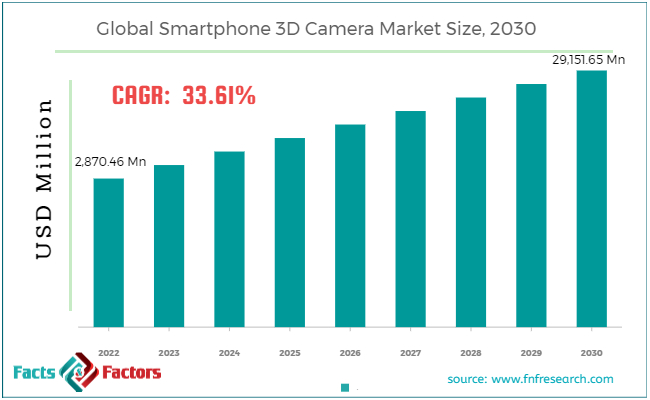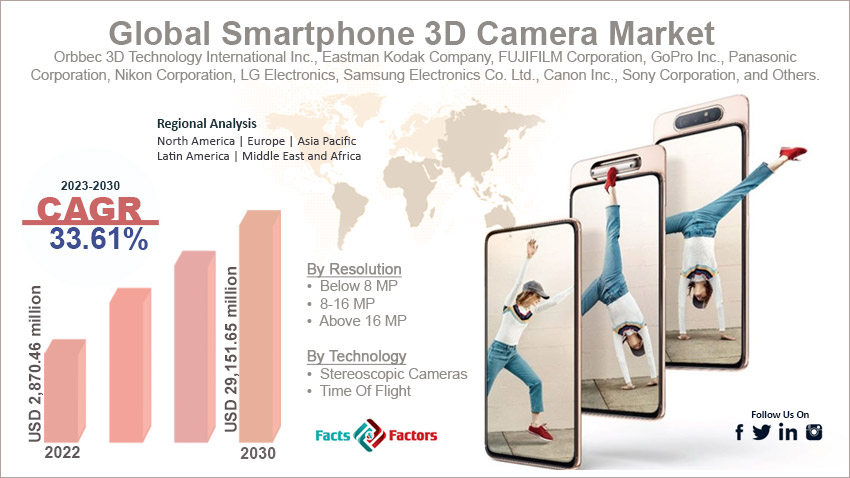Search Market Research Report
Smartphone 3D Camera Market Size, Share Global Analysis Report, 3D Camera Market Size, Share, Growth Analysis Report By Resolution (Below 8 MP, 8-16 MP, And Above 16 MP), By Technology (Stereoscopic Cameras And Time Of Flight), Smartphone 3D Camera Market By Resolution (Below 8 MP, 8-16 MP, And Above 16 MP), By Technology (Stereoscopic Cameras And Time Of Flight), And By Region - Global and Regional Industry Overview, Market Intelligence, Comprehensive Analysis, Historical Data, and Forecast, 2023-2030

Smartphone 3D Camera Market Size, Share, Growth Analysis Report By Resolution (Below 8 MP, 8-16 MP, And Above 16 MP), By Technology (Stereoscopic Cameras And Time Of Flight), Smartphone 3D Camera Market By Resolution (Below 8 MP, 8-16 MP, And Above 16 MP), By Technology (Stereoscopic Cameras And Time Of Flight), And By Region - Global and Regional Industry Overview, Market Intelligence, Comprehensive Analysis, Historical Data, and Forecast, 2023-2030
Industry Insights
[202+ Pages Report] According to Facts and Factors, the global smartphone 3D camera market size was valued at USD 2,870.46 million in 2022 and is predicted to surpass USD 29,151.65 million by the end of 2030. The smartphone 3D camera industry is expected to grow by a CAGR of 33.61%.

 Market Overview
Market Overview
Smart 3-D cameras are camera systems integrated into smartphones that capture and process three-dimensional images. These cameras adopt various technologies to create a sense of depth in the videos and photos, thereby helping users to capture and experience content in a more immersive way. The various technologies employed in the smartphone 3D camera include stereoscopic imaging, time of flight sensors, structured light systems, dual or multi-lens systems, depth-sensing cameras, and several others.
 Key Insights
Key Insights
- As per the analysis shared by our research analyst, the global smartphone 3D camera market size is estimated to grow annually at a CAGR of around 33.61% over the forecast period (2023-2030).
- In terms of revenue, the global smartphone 3D camera market size was valued at around USD 2,870.46 million in 2022 and is projected to reach USD 29,151.65 million by 2030.
- Growing consumer interest in imaging and photography is driving the growth of the global smartphone 3D camera market.
- Based on the resolution, the 8-16 MP segment is growing at a high rate and is projected to dominate the global market.
- Based on the technology, the time-of-flight segment is projected to swipe the largest market share.
- Based on region, North America is expected to dominate the global market during the forecast period.

 Growth Drivers
Growth Drivers
- Growing consumer interest in imaging and photography is likely to drive the growth of the global market.
Growing consumer interest in high-quality imaging, photography, and content creation is expected to drive the high demand for smartphones with advanced camera capabilities like 3-D features. Moreover, the continuous advancements in 3-D technologies like improved computational photography, higher resolution, and depth sensing further contribute to the overall growth of the global smartphone 3D camera market.
For instance, Artilux and II-VI launched a new 3D camera in July 2022 that utilizes shortwave infrared technology. The camera is majorly used for 3D sensing in the consumer electronics and automotive sectors.
 Restraints
Restraints
- Cost and affordability are likely to hamper the growth of the global market.
Integrating the 3D camera technology into smartphones increases production costs. This high cost limits the adoption of 3D cameras and smartphones, which further slows down the growth of the global smartphone 3D camera market.
 Opportunities
Opportunities
- Increasing use of virtual reality (VR) and augmented reality (AR) applications is expected to foster growth opportunities in the global market.
The surge in VR and AR applications in education, gaming, and other industries is creating a demand for smartphones with 3-D cameras, which are important for offering interactive and immersive experiences. Therefore, it is expected to widen the scope of the smartphone 3D camera industry.
For instance, TKH Group successfully acquired Nerian Vision Technologies, a Germany-based company, in July 2022 to extend its product offering. The aim is to enhance the accuracy of measuring objects in Nerian 3D cameras with advanced features.
 Challenges
Challenges
- Limited content ecosystem is a big challenge in the global market.
The availability of 3-D camera applications is essential for driving consumer interest. However, the content ecosystem for 3-D experience is limited, which is a big challenge in the growth of the smartphone 3D camera industry.
 Segmentation Analysis
Segmentation Analysis
The global smartphone 3D camera market can be segmented into resolution, technology, and region.
By resolution, the market can be segmented into below 8 MP, 8-16 MP, and above 16 MP. The 8-16 MP camera resolution segment is projected to swipe the largest market share in the smartphone 3D camera industry during the forecast period. Cameras with 8 to 16 MP resolution offer a balance between file size and image quality. It offers sharp and detailed photos that do not consume excessive storage space.
Smartphones with this resolution cater to a large number of users, from casual photographers to ones who need good image quality for social media sharing and everyday use. This camera resolution is more than enough for common photography requirements like capturing day-to-day activities, landscapes, family movements, and others.
Furthermore, manufacturers can optimize their camera performance with the help of software enhancements like computational photography, image processing algorithms, and AI-driven features to enhance the overall image quality. Therefore, such a landscape is likely to foster the huge developments in the segment.
By technology, the market can be segmented into stereoscopic cameras and time of flight. The time of flight segment accounts for the largest share of the global smartphone 3D camera market. The high growth rate of the segment is due to the strong influence of TOF technology in smartphones in the market. The time-of-flight sensors measure the time taken by smartphones for light or laser beams to travel to the subject and back. It helps in accurate depth sensing and 3-D mapping. It has a large number of applications, like facial recognition, improved photography, augmented reality, and others.
Moreover, the accurate depth sensing capabilities make them ideal for AR and VR applications where precise spatial awareness is required. Therefore, it offers a realistic and immersive experience to the users. Facial recognition technology that relies on depth sensing is becoming an essential part of smartphones. Biometric authentication is an essential feature in smartphones nowadays. Also, manufacturers nowadays are adopting TOF technology in their flagship devices, which further contributes to the growth of the segment.
 Report Scope
Report Scope
Report Attribute |
Details |
Market Size in 2022 |
USD 2,870.46 Million |
Projected Market Size in 2030 |
USD 29,151.65 Million |
CAGR Growth Rate |
33.61% CAGR |
Base Year |
2022 |
Forecast Years |
2023-2030 |
Key Market Players |
Orbbec 3D Technology International Inc., Eastman Kodak Company, FUJIFILM Corporation, GoPro Inc., Panasonic Corporation, Nikon Corporation, LG Electronics, Samsung Electronics Co. Ltd., Canon Inc., Sony Corporation, and Others. |
Key Segment |
By Resolution, By Technology, and Region |
Major Regions Covered |
North America, Europe, Asia Pacific, Latin America, and the Middle East &, Africa |
Purchase Options |
Request customized purchase options to meet your research needs. Explore purchase options |
 Regional Analysis
Regional Analysis
- North America to dominate the global market.
North America accounts for the largest share of the global smartphone 3D camera market. The wide adoption of 3-D camera technology smartphones is highly driven by factors like the emergence of virtual reality & augmented reality and growing consumer demand for high imaging capabilities.
Also, the leading smartphone manufacturers in the region, like Samsung and Apple, are showing interest in advanced camera technologies like 3-D sensing. 3-D camera smartphones are used for different applications like advanced facial recognition, accuracy, creation of 3-D models, and improved gaming experience. The regional market is expected to witness a strong surge in smartphones with advanced features and capabilities, and these 3-D cameras align with the increasing trends, which is expected to further push the growth of the regional market during the forecast period. The continuous advancements in depth sensing technologies also contribute to the development of 3-D camera capabilities in the region.
Moreover, the region witnesses a high prevalence of photography enthusiasts. There tends to be a high demand for smartphones with advanced camera capabilities that offer depth and advanced imaging features that appeal to users who value photography as their key use of smartphones. The regional market is highly competitive. Manufacturers are constantly striving to differentiate their products in the market. The inclusion of novel features like 3-D cameras can be a unique selling point for manufacturers in the regional market. Therefore, such a landscape is expected to propel the growth of the smartphone 3D camera industry.
Asia Pacific is expected to see steady developments in the global smartphone 3D camera market in the forthcoming years. Many countries in the region have a tech-savvy population that is keen on adopting the latest technologies.
Therefore, there is a high demand for smartphones with unique features like 3D cameras. The region is witnessing a surge in social media usage. Consumers in the region are prioritizing smartphones with high-quality cameras to avail high imaging capabilities, which further positively impact the growth trajectory of the regional market. Asia Pacific holds a significant gaming and entertainment market. 3D cameras help enhance the whole gaming experience with unique features like interactive applications and AR gaming.
However, it has led to an increase in demand from users. The region is a key player in the development and adoption of virtual reality and augmented reality technologies. Such a landscape is expected to foster development in the regional market. For instance, SICK came up with a safeVisionary2 compact 3D camera to extend its output and reimagine 3D safety for mobile robots in February 2023.
 Competitive Analysis
Competitive Analysis
The key players in the global smartphone 3D camera market include:
- Orbbec 3D Technology International Inc.
- Eastman Kodak Company
- FUJIFILM Corporation
- GoPro Inc.
- Panasonic Corporation
- Nikon Corporation
- LG Electronics
- Samsung Electronics Co. Ltd.
- Canon Inc.
- Sony Corporation
For instance, Alsontech launched AT-S1000-06C-S3, its newest 3D vision camera, in February 2023. It is a member of the NANO series and features Alsontech's advanced binocular imaging technology.
The global smartphone 3D camera market is segmented as follows:
 By Resolution Segment Analysis
By Resolution Segment Analysis
- Below 8 MP
- 8-16 MP
- Above 16 MP
 By Technology Segment Analysis
By Technology Segment Analysis
- Stereoscopic Cameras
- Time Of Flight
 By Regional Segment Analysis
By Regional Segment Analysis
- North America
- The U.S.
- Canada
- Mexico
- Europe
- France
- The UK
- Spain
- Germany
- Italy
- Rest of Europe
- Asia Pacific
- China
- Japan
- India
- Australia
- Southeast Asia
- Rest of Asia Pacific
- The Middle East & Africa
- Saudi Arabia
- UAE
- Egypt
- Kuwait
- South Africa
- Rest of the Middle East & Africa
- Latin America
- Brazil
- Argentina
- Rest of Latin America
- Orbbec 3D Technology International Inc.
- Eastman Kodak Company
- FUJIFILM Corporation
- GoPro Inc.
- Panasonic Corporation
- Nikon Corporation
- LG Electronics
- Samsung Electronics Co. Ltd.
- Canon Inc.
- Sony Corporation
Industry Major Market Players
- Orbbec 3D Technology International Inc.
- Eastman Kodak Company
- FUJIFILM Corporation
- GoPro Inc.
- Panasonic Corporation
- Nikon Corporation
- LG Electronics
- Samsung Electronics Co. Ltd.
- Canon Inc.
- Sony Corporation
Frequently Asked Questions

Copyright © 2025 - 2026, All Rights Reserved, Facts and Factors


